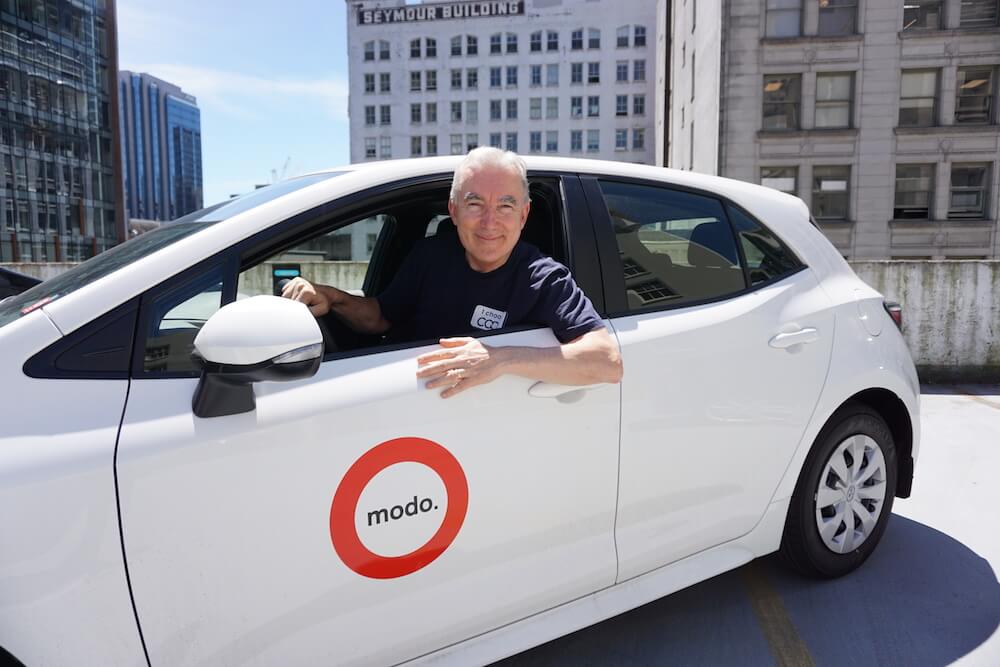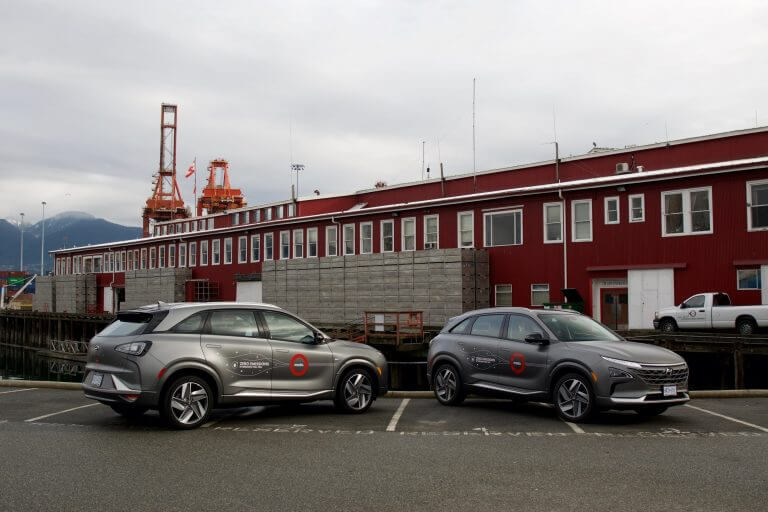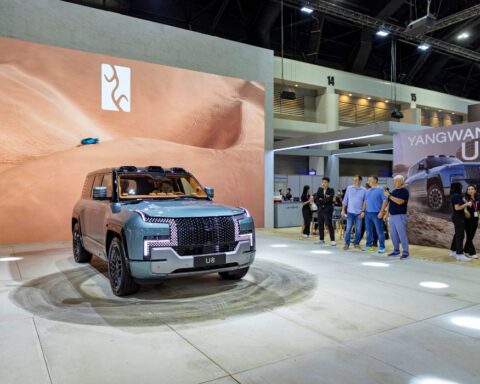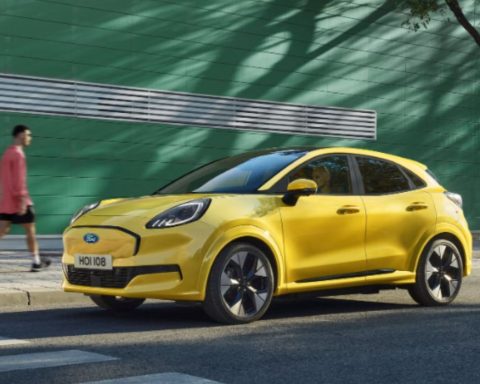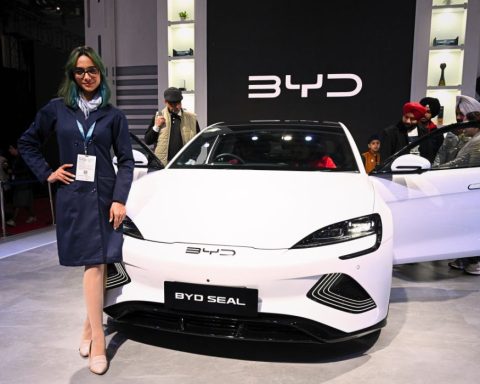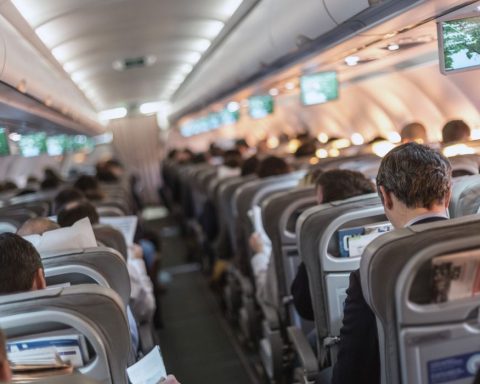Tucked in the corner of Patrick Nangle’s spartan Modo car-sharing office, with its pale walls and light-brown wooden desk, is a black commuter bicycle and a matching helmet dangling from the handlebar. A black-and-red backpack is tossed nonchalantly nearby on the hardwood floor.
Atypical as well—for most CEOs—is Nangle’s office attire: runners, jeans and a dark blue cotton shirt. That casual approach is present throughout Modo’s 300 square-metre Vancouver office, with its floor-to-ceiling photos of happy customers (called members), airy workspaces and cornucopia of fresh fruit in the coffee room. But the equanimity belies a serious mandate that is energized by Vancouver’s unique socially progressive spirit. This, says Nangle, is the Modo ethos of “transforming communities.”
Nangle is fairly new to the car-share company. He arrived in Vancouver in July 2016 following three and a half years as the CEO of Purolator, the $1.63 billion annual turnover Toronto-based company known for its premium overnight delivery service. On paper, Modo is tiny in comparison to Purolator, with its 5,000 vehicles and 12,000 employees. Modo has just 700 cars, mostly in British Columbia’s Lower Mainland area, but is revving up a model with potential impact on how billions of people get around in cities worldwide.
At Purolator, Nangle oversaw the company’s move away from a dedicated fleet of airplanes to a co-share model. This led to a significant reduction in greenhouse gases per package since planes could be full of cargo and more fuel-efficient. But Nangle had a desire to invest his time and effort more directly into issues that he was personally interested in—versus delivering a pair of shoes ordered online the same day. Asks Nangle, “Do the millennials driving e-commerce growth and the trend toward ever shorter delivery times, including same-day [delivery], realize the environmental consequences?”
“Do the millennials driving e-commerce growth and the trend toward ever shorter delivery times, including same-day [delivery], realize the environmental consequences?”
Concerns about how we’re impacting the planet prompted Nangle to walk away from his Purolator post and return to the mountains of Vancouver, his stomping grounds in the mid-1980s while he was working towards an MBA in international business at the University of British Columbia. “I have always been an environmentalist and I’m concerned about how things are going—the level of risk and pace of impact of climate change is accelerating,” says Nangle, an urban beekeeper who convinced more than a dozen neighbours to plant bee- and butterfly friendly flowerbeds on their boulevards.
Nangle is a pragmatic environmentalist. Riding his bike, taking a bus to the office or eating more sustainably might feel good in the fight against climate calamity but “in the scheme of things, it doesn’t make much of a big difference.” Taking the CEO position at Modo, however, he’d have the chance to directly influence the behaviour of tens of thousands of people, and potentially many more, by way of the Modo model. “At a macro level, it’s about transforming communities for the better: fewer cars, less congestion, better use of space, lower emissions, healthier lifestyles. At the household and individual level it’s about affordability and an affordable life, free of the burden of car ownership.”
Double digit growth Y-O-Y
Modo was first launched in Vancouver in 1997 by Simon Fraser University student Tracey Axelsson as North America’s second car-share service and first car-share co-op. Today, about 22,000 individuals are qualified to reserve and drive vehicles for as little as 30 minutes or as long as 10 days. The co-op has 11,000 members who pay $500 in shares and provide the organization with $5.5 million in capital. In combination with retained earnings, the money is used to fund a fleet of more than 700 vehicles, half of which are in the City of Vancouver. The rest are scattered throughout 24 municipalities in Metro Vancouver, Victoria and Kelowna.
Modo’s impact, however, outweighs its humble corporate stature as a for-profit cooperative that keeps costs low enough to ensure more people join—a tactic that has translated into double-digit growth year-over-year. Nangle looks at the number of vehicles that, today, are absent from Metro Vancouver’s choked roadway system thanks to Modo and its three sister car-sharing operations: Evo, Car2Go and Zipcar. Together, the companies have about 3,000 cars on the road in the Vancouver area, making it North America’s car-sharing capital.
“Car-sharing can be seen as a catalyst for more sustainable transportation choices,” says Nangle. “As long as people own a car they will tend to use it more and walk, cycle and use transit less.”
Studies show that one shared car replaces 10 private vehicles, effectively displacing 30,000 cars. Still, he admits, 30,000 cars “is a drop in the bucket.” Privately owned vehicles—not other car-sharing companies—are the real competition.
Nangle is referring to the 1.6 million light-duty vehicles currently on Metro Vancouver roadways. That’s two cars for every three people. And vehicle numbers will only mushroom as an anticipated one million people migrate into B.C. in the next two decades, which could translate into an additional 700,000 cars and trucks to further complicate the existing Gordian Knot of congestion.
“That will not be sustainable and we need to act now to get ahead of it. [One way is to] grow car sharing as fast as we can,” says Nangle. One of Modo’s key strategies is an accelerated transition to lower and zero emission vehicles. Modo started adding electric vehicles to its fleet in 2011 and electric and hybrid vehicles currently constitute 20% of its stable. Earlier this year it became the first car-share operator to make two zero-emission hydrogen fuel cell vehicles accessible to members.
If you build it, they will come
Modo is Canada’s first car-share operator to make zero-emission hydrogen fuel cell vehicles accessible to members.
Getting private vehicles off the roads requires multifaceted solutions, with good public transit being the biggest incentive to car sharing, says Nangle. Following a successful pitch to Metro Vancouver TransLink’s Open Innovation Call, Modo is working with partners on a plan intended to provide seamless movement across Vancouver using a variety of shared modes: bicycles, cars, buses and Skytrain. The initiative is being piloted in the near future.
How does Nangle think car-sharing and multimodal forms of transportation will fare in the future, as more people migrate to the West Coast? There will always be a split between those who car-share and those who don’t—the dividing line being who has the deeper pockets, Nangle says. (The need for children’s car seats also deters families from car-sharing.) BC’s inflated housing prices have forced many people to give up their vehicles, which in BC costs from $9,500 to $12,000 annually to operate, depending upon size and number of kilometres driven. “Our average member isn’t spending more than $1,000 a year.”
For the record, Nangle doesn’t see one-way ride-hailing services such as Uber and Lyft (soon to be permitted on B.C.’s streets) as a threat to Modo’s roundtrip car-share model. “We deliberately don’t compete with transit and will not be negatively impacted by Uber.” Adds Nangle, “In fact, to the extent that the availability of ride-hailing will encourage more people to live without the hassle of car ownership, that could prove to be a benefit to Modo.”
One of the biggest potential drivers of change is the autonomous, driverless vehicle, which Nangle estimates will take a decade to come into common use.
But no matter the pace of change, Modo will be at the front of the pack, Nangle says. “I was brought on by the board of directors to work on strategy at a high level to keep this wonderful, well-loved, local and a bit quirky co-op going in a world that’s changing really fast.”
Roberta Staley is a magazine editor and writer specializing in medical, science and business reporting.


